-
2
Threads -
4 GB
ECC Reg RAM -
40 GB
SAS SSD Storage - 1 GBit/s connection
- Traffic included (fair use)
- Daily backup
Linux SSD vServer / VPS
Lightning-fast vServers thanks to Full-Flash Storage!
- ✓SAS SSD Storage
- ✓KVM Virtualization
- ✓Fast Availability
- ✓Data Center Location Frankfurt am Main
Products
-
4
Threads -
8 GB
ECC Reg RAM -
80 GB
SAS SSD Storage - 1 GBit/s connection
- Traffic included (fair use)
- Daily backup
-
8
Threads -
16 GB
ECC Reg RAM -
160 GB
SAS SSD Storage - 1 GBit/s connection
- Traffic included (fair use)
- Daily backup
-
16
Threads -
32 GB
ECC Reg RAM -
320 GB
SAS SSD Storage - 1 GBit/s connection
- Traffic included (fair use)
- Daily backup
Can't find the right package? Our Linux vServer overview will help you quickly find the right offer. For enterprise solutions, take a look at our Compute vServer or our highly available Ceph HA vServer. If you need even more performance, our dedicated servers may be just right for you. If you have any special requirements or questions, our support team will be happy to help!
Key Points at a Glance
Special features Linux SSD vServer
Our Linux SSD vServer products are the perfect introduction to a Linux server environment. They offer the perfect combination of price and performance thanks to the use of SAS SSDs in RAID 10.
Each Linux SSD vServer node is redundantly connected to the network and power within our data center environment in Frankfurt to realize maximum availability on the hardware side.
Common Linux operating systems are provided to our vServer customers via 1-click installation. An installation of the Linux vServer using an own ISO is also possible.
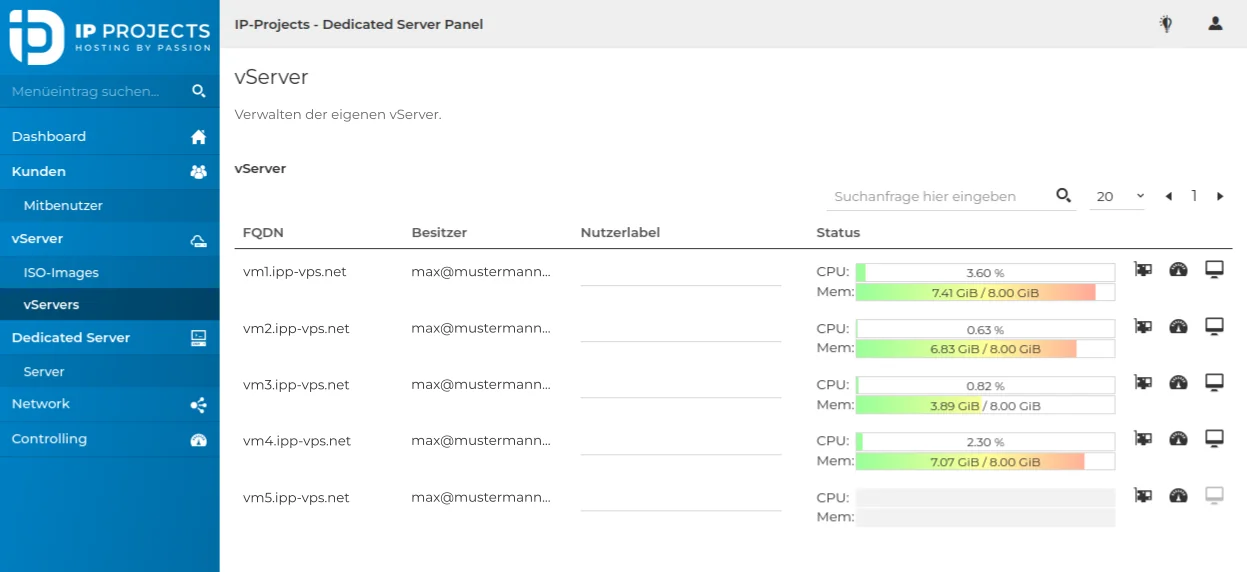
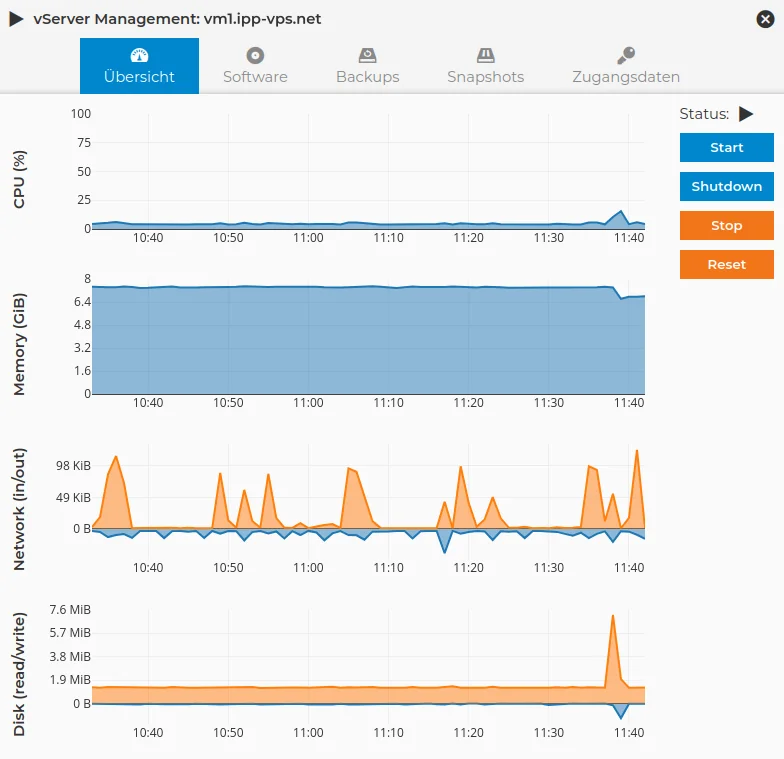

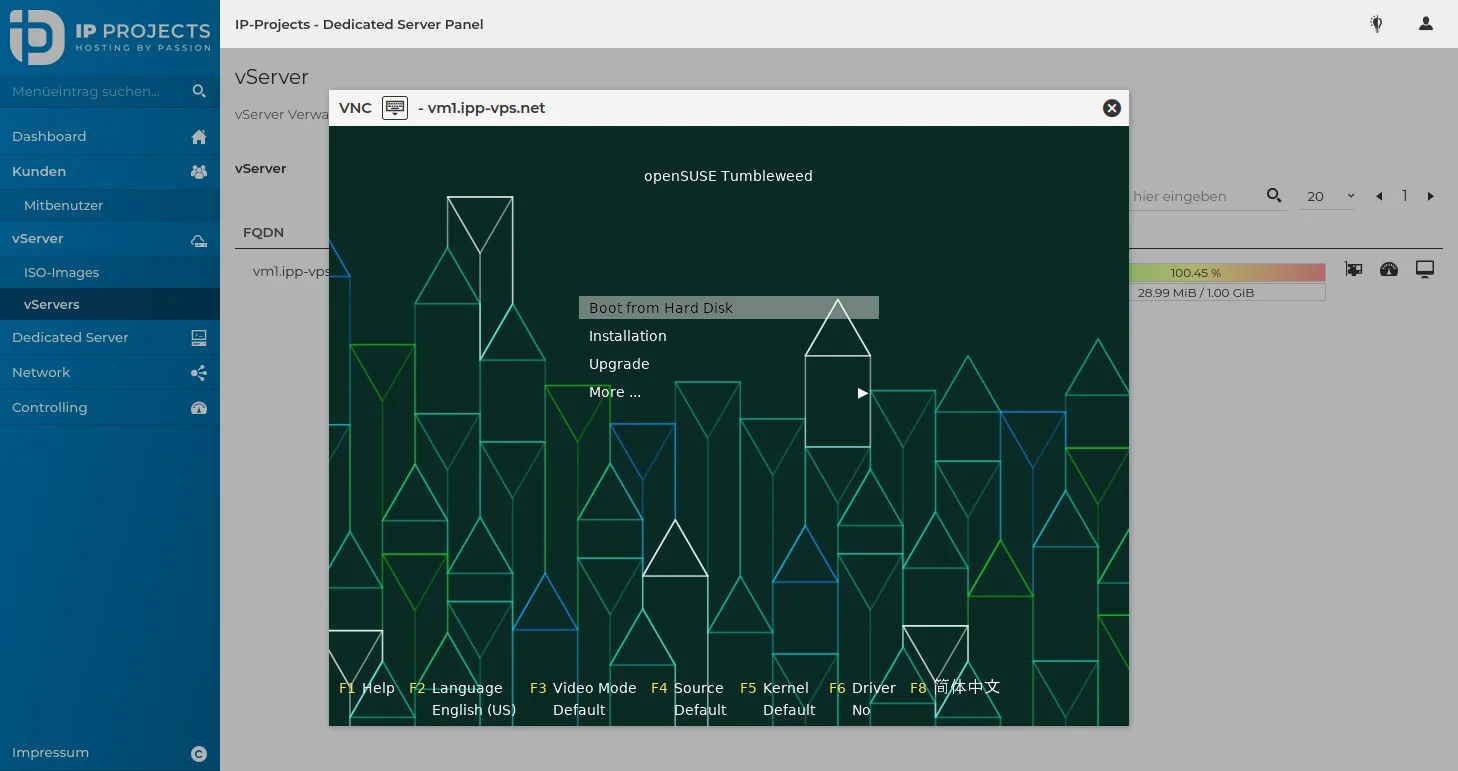
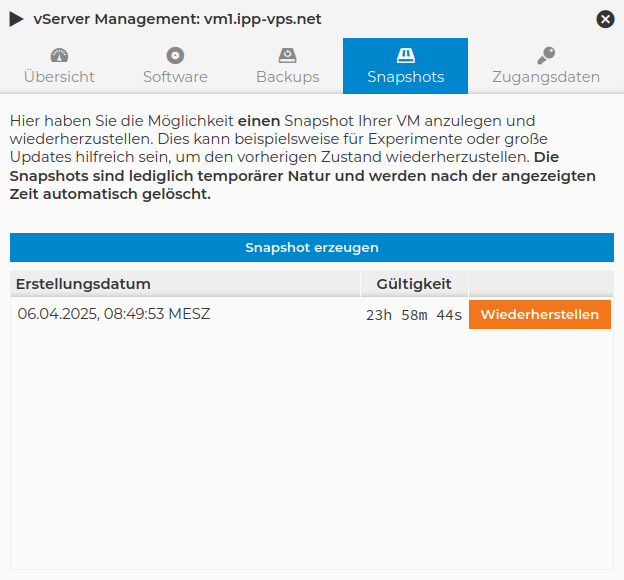
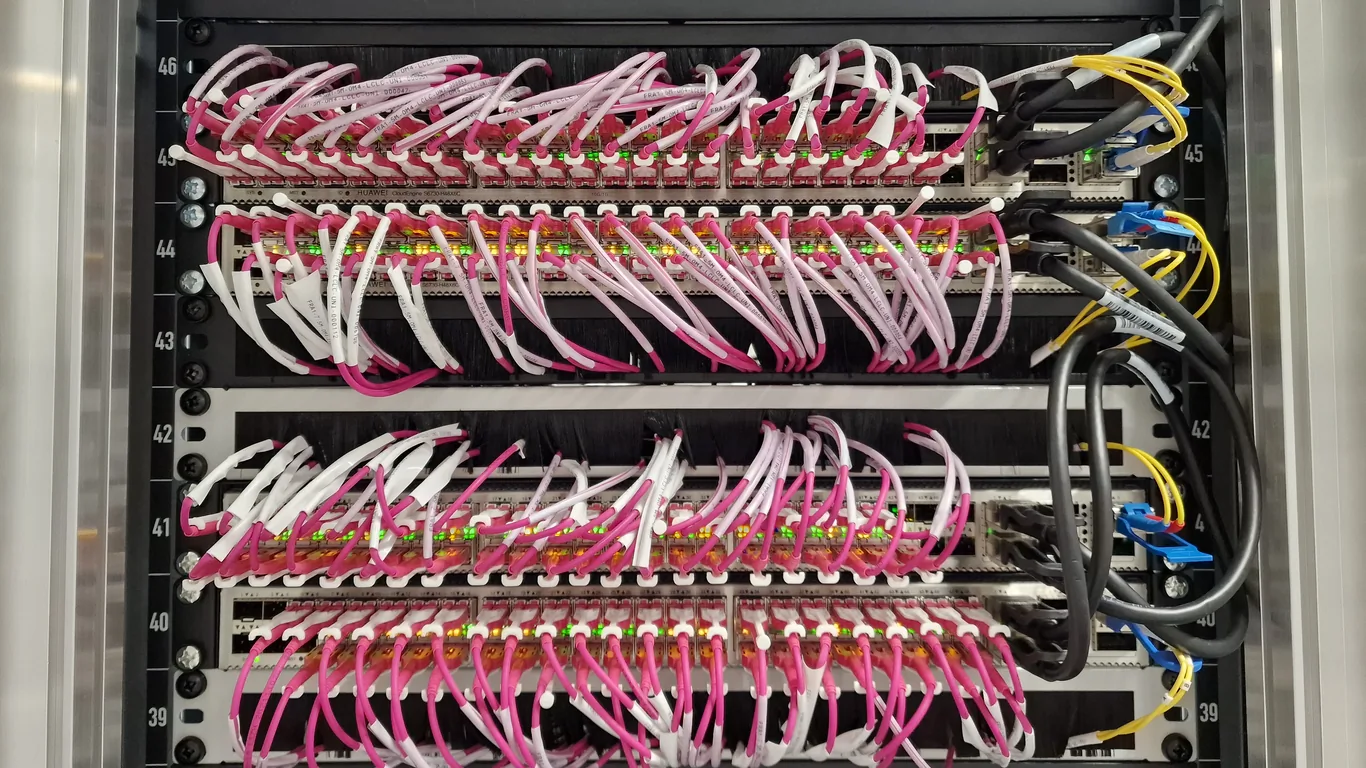
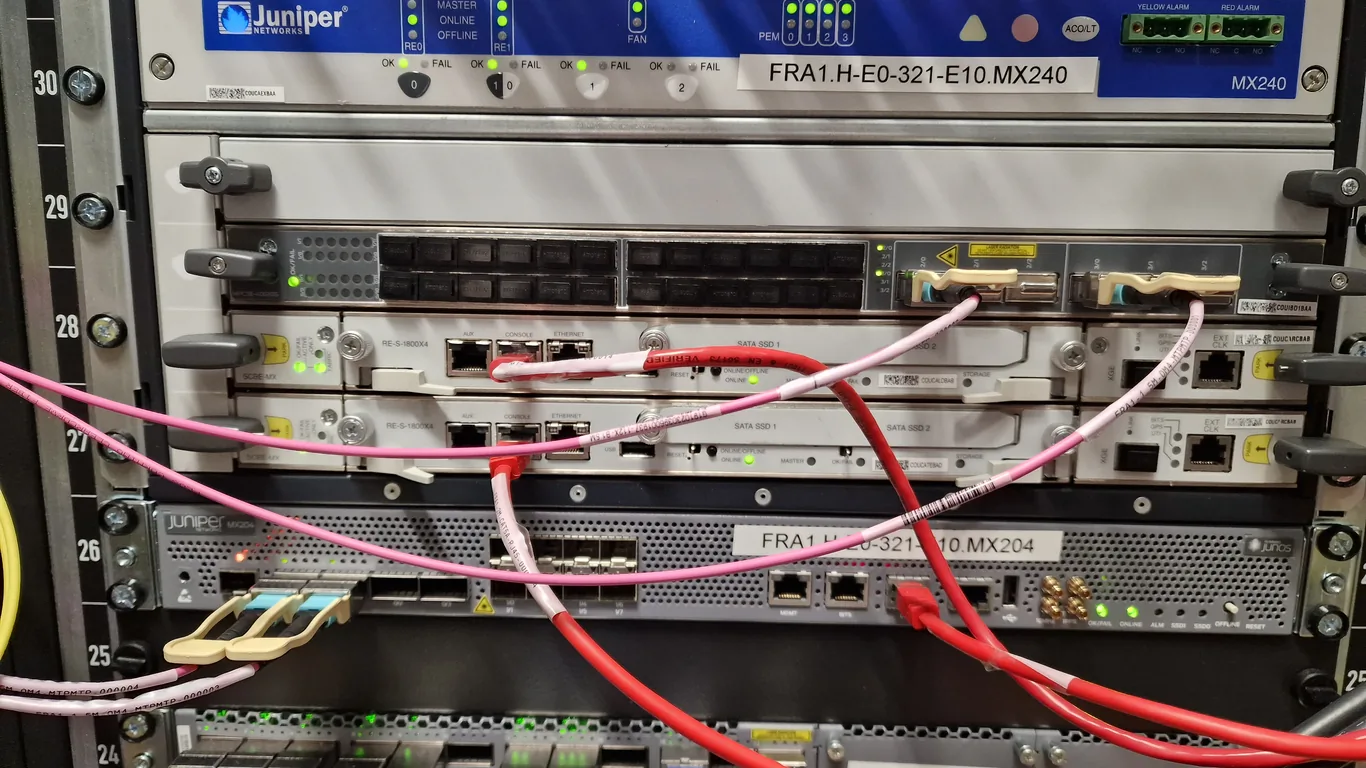
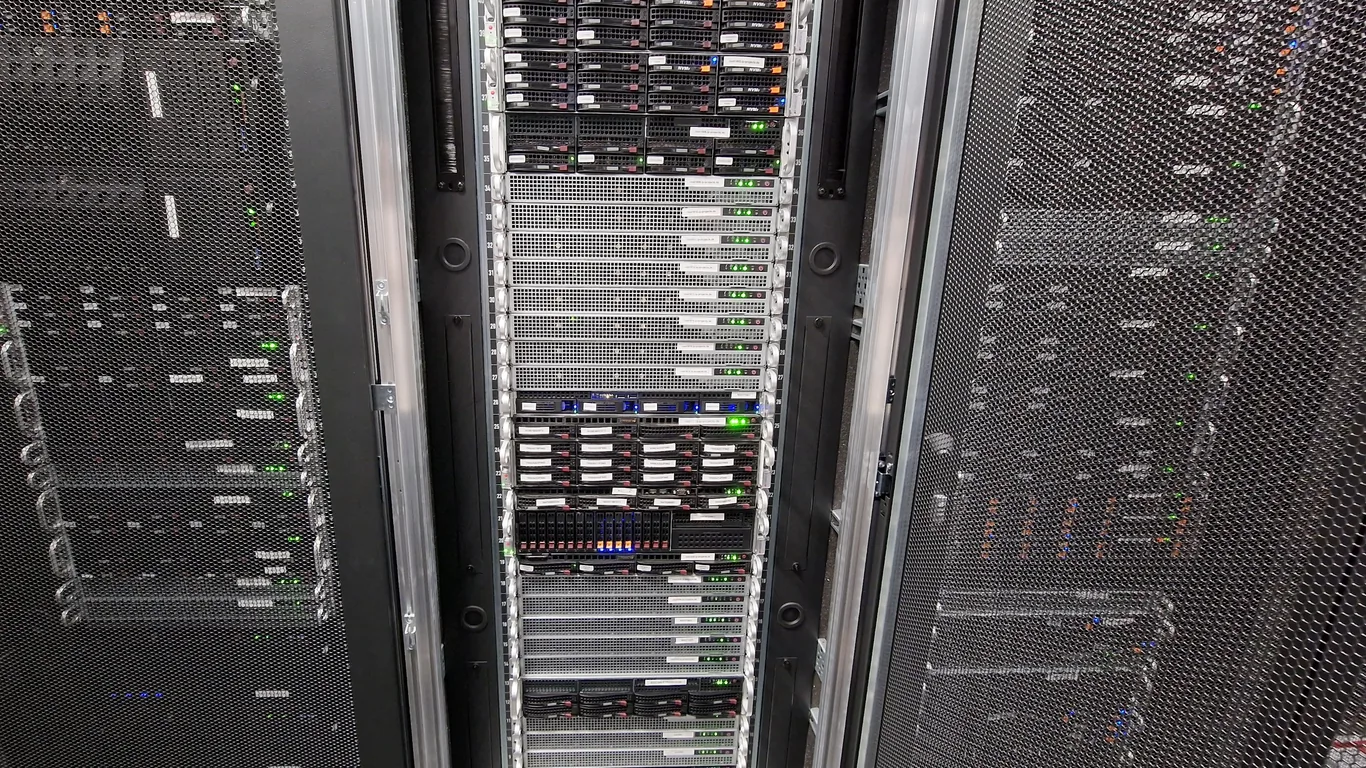
Easy vServer management: auto-installation, ISO mounts, IP/rDNS management, snapshots, backups, and much more!
The administration of our vServers is handled via our self-developed vServer management system. Installation, restarts, monitoring, IP management, and traffic analysis become effortless.
Through the individual dialogs, you always have direct access to the most important parameters and actions.
We offer all common operating systems for installation. Either as an automatic Cloud-Init installation. If we do not offer your desired operating system, ISO images can also be installed via VNC access.
Whether it's installation or troubleshooting. With VNC, you have direct access to your vServer at all times.
Snapshot and backup management is also simple and clear. This means you have everything under control, even if a problem arises.
Redundant core switch stacks for 10 Gigabit/s direct cabling - 80 Gigabit/s connection to routing stack - FRA1 location
Redundant routing stack consisting of technically different routers that are almost identical in terms of performance characteristics - Location FRA1
Server rack 0.8 x 1.2 meters with redundant top-of-rack switch stack and redundant 2-feed power supply - location FRA1
For more green IT
The carbon footprint of the Internet with its servers and data centers is growing incessantly. However, in addition to using energy-efficient hardware, we can also actively support nature: With every new rating - whether positive or negative - we therefore have 2 new trees planted.
Server Location Frankfurt am Main
Highest Hardware Redundancy
Fast Deployment
100% Green Power
Simple Server Management
KVM Virtualization
DDoS Protection
Upgrade Possible Anytime
Frequently asked questions
What is a Linux SSD vServer?

Our SSD vServers are virtual servers with Solid State Drives (SSD) as storage solution. Compared to conventional hard disks (HDDs), SSD storage offers significantly faster loading times, better performance and higher reliability - even at a low entry-level price. We do not rely on normal SATA SSDs, but on Enterprise SAS SSDs. These guarantee high availability in combination with high speed.
Why are SSD vServers so cheap?

Our Linux SSD vServers do not use the latest hardware or technology. We rely on the reuse of existing infrastructure and host systems while at the same time renewing the storage systems. This allows us to save investment costs and offer our customers an excellent price/performance ratio.
Who is an SSD vServer suitable for?

Our Linux SSD vServers are perfect entry-level vServers. They are suitable for e.g:
- Small Websites, Blogs or Web business cards
- Simple WebApps
- private Gameservers, Mailservers, NextCloud
- Staging/Testing
What about security and data protection?

Our affordable SSD vServer product line also meets all current security and data protection standards.
- Our servers are located in European data centers - currently exclusively in Frankfurt am Main
- GDPR-compliant
- Daily data backup of the virtual machines
- Regular infrastructure maintenance - thanks to vServer Cluster without downtime of our SSD vServers
Can I upgrade at any time?

Yes - an upgrade is possible at any time within our vServer packages. If you are already using the largest SSD vServer offer, our staff will be happy to help you find the right solution for you.
Are the SSDs secured redundantly?

Even our cheapest vServer product line offers maximum data security through a ZFS RAID 10 consisting of at least 4 SAS SSDs. This is local storage (directly in the host) to provide maximum performance.
Are there snapshots or automatic backups?

Yes, you can create a snapshot of your SSD VM at any time, e.g. in the course of operating system updates. This is then available to you for 24 hours, after which it is automatically removed again. The snapshots offer a number of advantages:
- Quick backup before changes - e.g., for operating system updates
- Rollback in case of errors or bugs
- Test environments & experimentation
- Temporary backup before migrations
- Complement to regular backups
- Multistage deployments / CI pipelines
- Troubleshooting & debugging Neben der Snapshot-Funktion verfügen unsere Linux SSD vServer auch über ein tägliches Backup an einem unserer anderen Standorte. Alle 24 Stunden wird ein inkrementelles Backup erstellt, das mit wenigen Klicks über unser vServer Management Webinterface wiederhergestellt werden kann. Dieses tägliche Backup kann gegen einen geringen Aufpreis auf einen Wiederherstellungszeitraum von 7 Tagen erweitert werden.
Are there any restrictions?

There are no technical restrictions or specifications on our part. However, you should note that the Linux SSD vServers are not suitable for the following use cases due to the technical conditions:
- High-Availability Services
- Large databases
- Mass storage projects
- CPU/GPU-intensive applications We offer specialized vServer tariffs for these purposes.
Which CPU and which RAM are used for the SSD vServer offers?

Intel Xeon CPUs are used in our inexpensive Linux SSD vServer offers. These offer a good balance of price/performance and can also score with energy efficiency. We use ECC Registered DDR4 RAM (DDR4-RDIMM) for the main memory. This is a special form of RAM that is primarily used in servers, workstations and critical systems. ECC stands for 'Error Correcting Code' and 'Registered' means that an additional intermediate memory (register chip) is used before the memory chips.
How fast is the Linux SSD vServer provided?

If you are a new customer, the Linux SSD vServer will be provided immediately after verification of the customer account by our employees. If you are an existing customer, it will be provided after your order has been processed and checked by our staff.
Do I also get an IPv4 & IPv6 address for my Linux SSD vServer?

Yes - our inexpensive Linux SSD vServers also include an IPv4 address and a /64 IPv6 subnet in the offer price. We provide both free of charge with the provision of the SSD vServer.
Will my data be preserved during a vServer upgrade?

Yes, if you decide to upgrade to the next larger SSD vServer package, your vServer data will remain unchanged. The Linux SSD vServer will only be given more resources on the hypervisor, so that more RAM or more hard disk capacity is available afterwards. However, the upgrade requires the vServer to be restarted. This should be taken into account when booking the upgrade.
Linux vServer operating systems
Linux SSD vServer Administration
vServer administration options
Of course, basic vServer administration functions are available with all our vServer products. These include:
- starting / stopping / restarting
- (re)installation
- VNC remote access
- stats like utilization and traffic
Following features are available with each of our vServer offerings:
vServer Backup Management
To always have a backup of your current data, each of our Linux SSD vServers includes free backups of the last 24 hours.
The backups are also stored decentrally in a separate data center so that data loss due to a fire is impossible.
Linux SSD vServer Operating System Installation
The installation of our Linux SSD vServer is possible as 1-click via our server management. Thereby all common Linux operating systems are available. If you still need a special Linux, you have the possibility of an ISO installation.
The ISO installation is then done with the help of a VNC console, which is directly integrated into our server management. An additional VNC client is not required to use this management function.
Permanent VNC Console
To ensure that you always have the ability to access the virtual machine regardless of the Linux SSD vServer operating system, a permanent VNC console is available through our vServer administration panel. Therefore, if you make any misconfigurations - for example on the network - you can use this VNC console to undo the misconfiguration without the need for our customer support or restoring a backup.
The VNC console can be called directly from the web interface. An additional VNC client is not required, which makes working with VNC much easier at this point.
IP and R-DNS Management
Of course you can view your IP addresses and set R-DNS / PTR entries via our Linux SSD vServer management. Setting R-DNS / PTR entries on an IP address is necessary to ensure smooth email traffic. Many e-mail servers on the Internet reject e-mails if no R-DNS / PTR entry is set for an IP address. Our name servers are also secured using DNSSEC to prevent manipulation of these entries by third parties. Likewise, all IP addresses that we provide to our customers are secured using RPKI.




